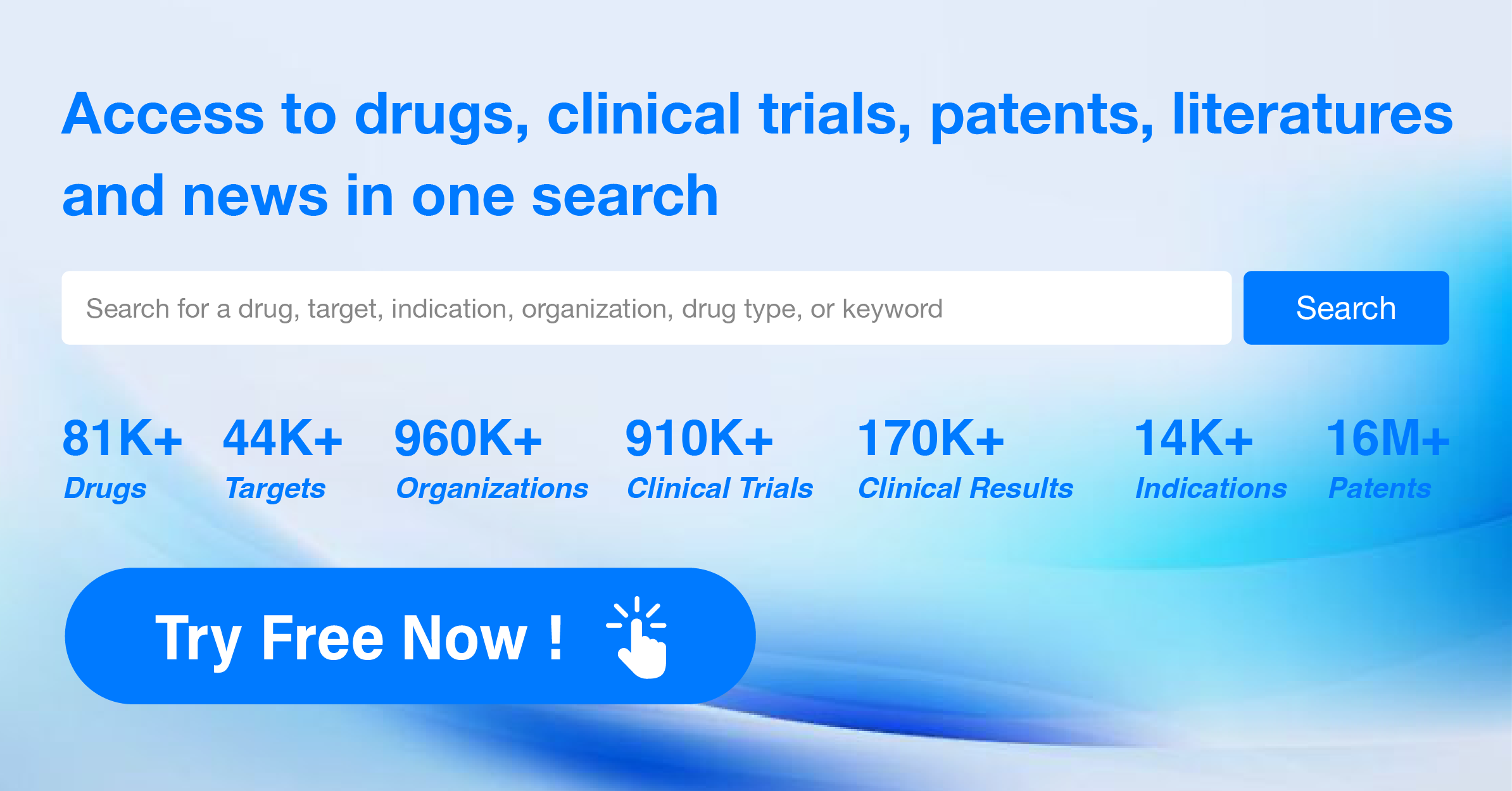Pharma Frontiers: Daily Digest of Global Pharmaceutical News - May 9
1.Eli Lilly Announces Upcoming FDA Advisory Meeting on Donanemab New Drug Application for Early Symptomatic Alzheimer's Disease
On May 8th, Eli Lilly and Company announced that the FDA's Peripheral and Central Nervous System Drugs Advisory Committee (PCNS) will convene on June 10th, 2024, to discuss the New Drug Application (NDA) for donanemab, an antibody therapy for the treatment of early symptomatic Alzheimer's disease (AD). Alzheimer’s disease is the most common neurodegenerative disease among the elderly, characterized by the accumulation of amyloid-beta plaques in the brain—a hallmark of the disease. Targeting amyloid-beta is a key strategy in the development of new Alzheimer’s treatments.
Donanemab specifically binds to a subtype of amyloid-beta known as N3pG. By targeting this subtype, donanemab selectively binds to amyloid plaques in the brain, facilitating their clearance. The application for donanemab is primarily supported by the results of the Phase 3 TRAILBLAZER-ALZ 2 trial. This trial was a double-blind, placebo-controlled study aimed at assessing the safety and efficacy of donanemab in patients aged 60-85 years with early symptomatic AD, characterized by mild cognitive impairment or mild dementia due to AD. These patients exhibit confirmed AD neuropathological features.
Participants were grouped based on low to moderate or high levels of tau—as revealed by Positron Emission Tomography (PET) imaging, indicative of later stages of disease pathology. Over 18 months, all participants were evaluated using scales that measure cognitive and functional metrics, including the Integrated Alzheimer’s Disease Rating Scale (iADRS) and the Clinical Dementia Rating–Sum of Boxes (CDR-SB), where a higher score signifies lower clinical functionality.
2.Amyotrophic Lateral Sclerosis (ALS) Small Molecule Therapy PrimeC Phase 2b Clinical Results Positive
On May 8, NeuroSense Therapeutics announced the latest analysis results of their Phase 2b clinical trial, PARADIGM. The analysis indicated that patients with high-risk Amyotrophic Lateral Sclerosis (ALS), treated with their investigational therapy PrimeC, showed a significant slowing in disease progression of 43% (p=0.02) compared to the placebo group. The company plans to use this data to help design the upcoming pivotal clinical trials to increase the success rate of the trials. Data analysis revealed that after 6 months of treatment, the difference in the ALS Functional Rating Scale-Revised (ALSFRS-R) scores between the PrimeC group and the control group was 5.04 points in favor of PrimeC (CI: 0.862, 9.214; n=38). According to the European Network for the Cure of ALS (ENCALS) risk factors, high-risk patients constitute about 50% of the total ALS patient population. In patients diagnosed for the first time with symptoms persisting for more than 12 months before treatment, those treated with PrimeC showed a 52% slowing in disease progression compared to the placebo group (p=0.008), with an ALSFRS-R score difference of 7.76 points in favor of PrimeC (CI: 2.27, 13.25; n=22). These subgroup analysis results consistently demonstrated significant impacts of PrimeC on different patient groups in the PARADIGM study. NeuroSense's lead candidate drug, PrimeC, is a novel sustained-release oral formulation containing two FDA-approved drugs: Ciprofloxacin and Celecoxib. PrimeC aims to synergistically target multiple key mechanisms of ALS—including motor neuron degeneration, inflammation, iron accumulation, and RNA regulation abnormalities—to potentially inhibit the progression of ALS. PrimeC has been granted Orphan Drug designation by both the U.S. FDA and the European Medicines Agency.
3.Sanofi's Innovative Hemophilia Therapy, Fitusiran Injectable, Filed for Market Approval in China
On May 7th, the official website of the Center for Drug Evaluation (CDE) of China's National Medical Products Administration publicized that the application for market approval of Fitusiran injectable, a class 1 new drug jointly filed by Sanofi and Genzyme, has been accepted. According to publicly available information, this product is a small interfering RNA (siRNA) therapy developed for hemophilia, intended to be a prophylactic treatment for patients with Hemophilia A or Hemophilia B, whether they produce inhibitors to clotting factors or not. Administered via subcutaneous injection, Fitusiran is expected to provide prophylactic treatment for all types of hemophilia patients. In two phase III clinical studies, the annualized bleeding rate in patients receiving a monthly subcutaneous injection of Fitusiran as a prophylactic treatment was reduced by 90% compared to the control group.
Hemophilia is a rare genetic bleeding disorder caused by a deficiency of clotting factor VIII (FVIII) or IX (FIX), classified into Hemophilia A and Hemophilia B. The deficiency in clotting factors results in insufficient thrombin generation, leading to coagulation disorders. The main clinical manifestations of these two types of hemophilia are recurrent bleeding and its related complications, with about 80% being joint bleeds. The complications primarily involve chronic hemorrhagic joint conditions, which can lead to severe joint deformities.
According to Sanofi's public information, Fitusiran decreases levels of antithrombin (a protein that inhibits blood clotting), thereby promoting thrombin generation, rebalancing hemostatic function, and preventing bleeding. The product utilizes ESC-GalNAc conjugate technology from Alnylam Pharmaceuticals, enhancing its potency and durability when administered subcutaneously. According to an article published in The Lancet last year, Fitusiran is the first siRNA therapy developed for hemophilia, and also the first new prophylactic hemostatic method effective for both types of Hemophilia A and B, with or without inhibitors.
4.Real-World Data on Sanofi/AstraZeneca RSV Monoclonal Antibody Published in The Lancet
On May 7th, Sanofi announced that interim results from an ongoing study, recently published in The Lancet, have shown that infants under 6 months old receiving Nirsevimab injection had an 82% reduction in hospitalization rates due to lower respiratory tract infections (LRTI) caused by Respiratory Syncytial Virus (RSV) compared to infants who did not receive any intervention. Nirsevimab is a long-acting RSV monoclonal antibody developed jointly by Sanofi and AstraZeneca. In China, this medication was approved in December 2023 for preventing LRTIs caused by RSV in newborns and infants. In the 2023-2024 RSV season, extensive immunization programs targeting broad infant populations were launched in the United States, Spain, and France. These study findings are consistent with the real-world evidence (RWE) gathered during the implementation of immunization strategies in the aforementioned countries, further confirming Nirsevimab's consistent protective effect against LRTI caused by RSV. Compared to results obtained under strictly controlled clinical trial conditions, real-world studies help evaluate the effectiveness and safety of medications or preventive measures in practical clinical applications. Post-marketing use of Nirsevimab has also shown good safety, consistent with the clinical study outcomes. NIRSE-GAL is a population-based, three-year, large-scale follow-up study aimed at assessing the preventive effectiveness of Nirsevimab after its inclusion in the immunization program in Galicia, Spain. This study aims to measure the prevention of RSV-related lower respiratory tract infection diseases and hospitalization rates in infants, covering infants born during the infection season, infants under 6 months old at the start of the season, and infants and toddlers aged 6-24 months susceptible to severe diseases caused by RSV.
5.AstraZeneca's radiopharmaceutical FPI-2265 initiates Phase II/III Clinical Trial
On May 7, the Clinicaltrials website displayed that Fusion Pharmaceuticals, a subsidiary of AstraZeneca, has commenced a Phase II/III clinical trial for its radiopharmaceutical, FPI-2265 (225Ac-PSMA-I&T). This drug is the first radiopharmaceutical in AstraZeneca's pipeline to enter the latter stages of development. The study is a randomized, multicenter, open-label clinical trial aimed at evaluating the safety, tolerability, and anti-tumor activity of FPI-2265 in patients with PSMA-positive metastatic castration-resistant prostate cancer (mCRPC) who have previously received treatment with 177Lu-PSMA-617 or other 177Lu-PSMA radioligand therapies. Participants will be divided into three cohorts, receiving FPI-2265 at dosages of 50kBq/kg every 4 weeks, 75kBq/kg every 6 weeks, or 100kBq/kg every 8 weeks. The primary endpoints of the study include the proportion and duration of patients achieving a PSA50 response (at least a 50% reduction in PSA levels) and safety metrics.
AstraZeneca's pipeline includes four investigational radiopharmaceuticals: FPI-2265, FPI-1434, FPI-2068, and FPI-2059, with the latter three still in early stages. All four drugs originate from Fusion Pharmaceuticals. In March this year, AstraZeneca acquired this company for $2.4 billion, obtaining all its assets. Previously, FPI-2265 was evaluated in a Phase II trial for mCRPC patients and interim analysis results were presented at the 2024 AACR conference. The findings indicated that FPI-2265 is effective in heavily pre-treated progressive mCRPC patients including those previously treated with 177Lu-based radioligand therapies. The safety, tolerability, and clinical efficacy data are consistent with other published studies involving small-molecule based 225Ac-PSMA radiopharmaceuticals.
6.Brii Biosciences Proposes Inclusion of Two Innovative Drugs as Breakthrough Therapy Designations
On May 7, the official website of the Center for Drug Evaluation (CDE) of the China National Medical Products Administration reported that Brii Biosciences has filed for two products to be designated as breakthrough therapy drugs, aimed at treating chronic Hepatitis B Virus (HBV) infection and HBV/Hepatitis D Virus (HDV) co-infection. Public records indicate that BRII-835 and BRII-877 are, respectively, a subcutaneous injection siRNA drug and a monoclonal antibody drug, both of which have a synergistic effect that can significantly reduce Hepatitis B Surface Antigen (HBsAg) without significant clinical safety signals. As part of Brii Biosciences’ distinctive approach to developing a functional cure for HBV, the company, together with its partners, is conducting numerous combined medication studies for these two products. BRII-835 is an investigational siRNA drug administered via subcutaneous injection targeting HBV, which shows potential for both direct antiviral activity against HBV and inducing effective immune responses. This siRNA product utilizes Enhanced Stabilization Chemistry+ (ESC+) technology to boost stability and minimize off-target effects, thereby enhancing therapeutic efficacy. In 2020, Brii Biosciences acquired the rights for the development and commercialization of this product in the Greater China region from Vir Biotechnology. BRII-877 is an investigational subcutaneous monoclonal antibody for HBV that aims to block all ten genotypes of HBV entering liver cells and reduce the levels of viral and subviral particles in the blood. The product incorporates Xencor's Xtend and other Fc technologies which are hoped to serve as a T-cell vaccine against HBV in infected patients, with an extended half-life. Brii Biosciences obtained exclusive rights to develop and commercialize BRII-877 in the Greater China area from Vir Biotechnology in 2022.
7.Sanegene Bio and Innovent Biologics have jointly filed for clinical trials in China for their co-developed siRNA drug
On May 8th, Sanegene Bio announced that the clinical trial application for SGB-3908, an siRNA drug developed in collaboration with Innovent Biologics for the treatment of hypertension, has been officially accepted by the Center for Drug Evaluation (CDE) of the China National Medical Products Administration. Hypertension is a common chronic condition that not only increases the risk of cardiovascular and cerebrovascular diseases but can also lead to complications such as kidney damage and vision impairment. Although effective antihypertensive treatments are available, these treatments require daily medication. Due to the often subtle symptoms of hypertension, patients may forget to take their medication, leading to poor compliance, which poses a major challenge in managing the condition. Angiotensinogen (AGT) is the most upstream precursor in the renin-angiotensin-aldosterone system (RAAS), and its role in blood pressure regulation has been validated; inhibiting AGT is acknowledged to have antihypertensive effects. Addressing the treatment challenges in hypertension, siRNA drugs can directly reduce the expression of AGT, offering differentiated advantages such as sustained drug effects, good safety profiles, and high patient compliance, potentially providing better treatment options and long-term benefits for patients. SGB-3908 is a siRNA drug targeting AGT, intended for the treatment of hypertension. According to the press release from Sanegene Bio, SGB-3908 utilizes the company’s next-generation siRNA drug platform technology, which enhances the drug’s activity and duration of efficacy, and demonstrates good tolerability. Preclinical experimental data indicate that SGB-3908 significantly reduces the levels of AGT protein and related biomarkers (ANG I, ANG II) in the serum of hypertensive crab-eating macaques, achieving marked blood pressure reduction with sustained effects, and no hypotension or other safety concerns were observed.
8.BioNTech has introduced a preclinical bispecific antibody from Pumis Biotechnology
On May 8, Pumis Biotechnology announced that BioNTech has exercised an exclusive global option agreement. Under this agreement, BioNTech will secure the global rights for the development, production, and commercialization of a preclinical bispecific antibody candidate independently developed by Pumis. Should the candidate be successfully developed and authorized, Pumis will receive option exercise fees and additional payments upon product commercialization. This exercise of option is based on the strategic research collaboration, project introduction option, and global licensing agreement signed with BioNTech in July 2023. The agreement stipulates that BioNTech gains exclusive global options to a preclinical-stage bispecific antibody and a clinical-stage bispecific antibody developed by Pumis for the treatment of malignant tumors.
Founded in 2018, Pumis Biotechnology focuses on malignant tumors and autoimmune diseases, dedicating itself to the research, development, and industrialization of national class I innovative biopharmaceuticals. Currently, Pumis has 17 bispecific antibody drugs under development in its pipeline, six of which are in the clinical study phase. The most advanced in their development is PM8002, a PD-L1/VEGF-A bispecific antibody, the global rights for which were licensed to BioNTech in November 2023.




